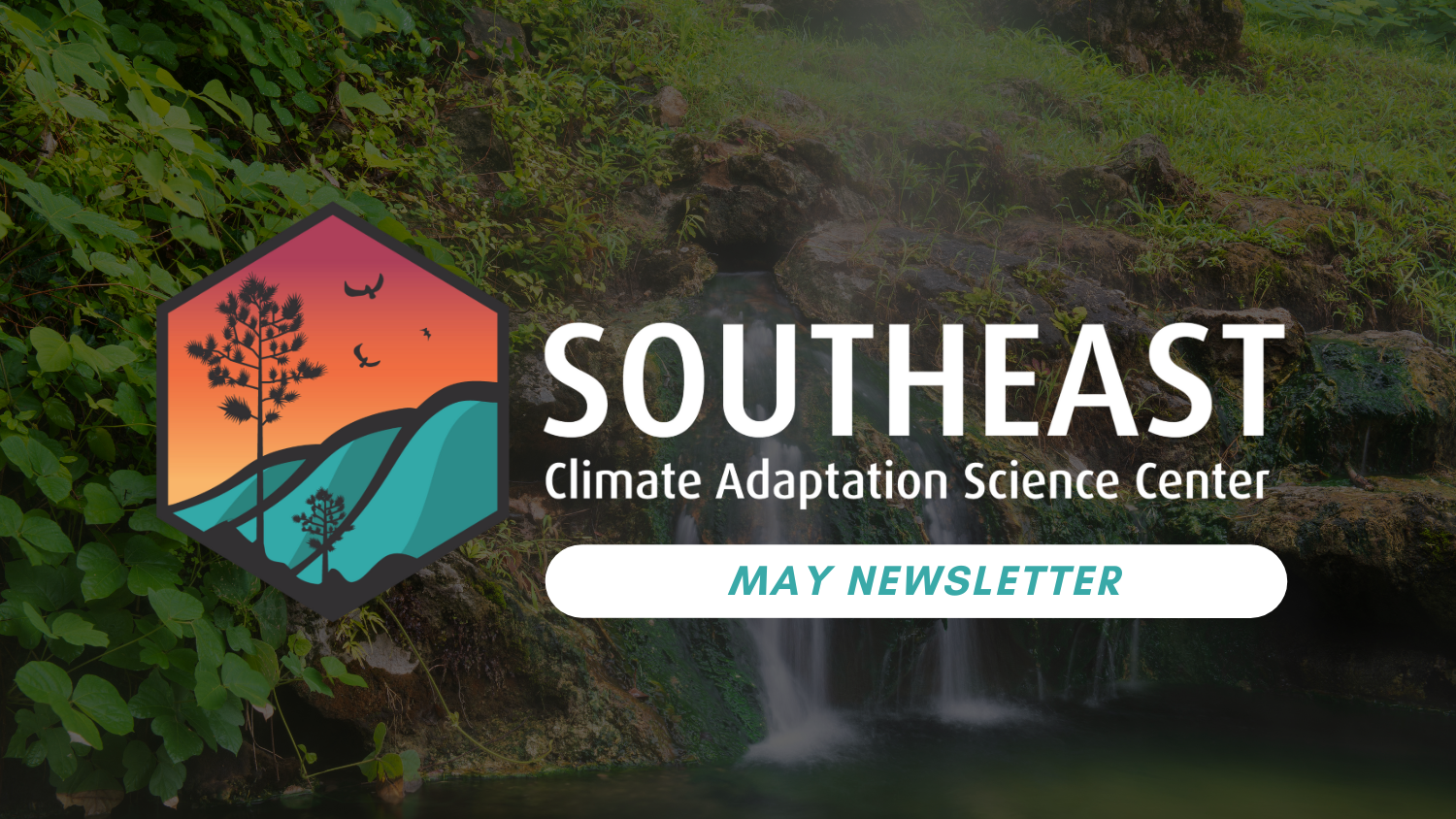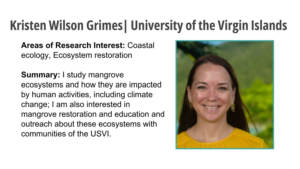May 2024 Newsletter

Get this in your inbox by subscribing to our monthly newsletter here.
Don’t miss the June 20 science seminar, “A Spatiotemporal Recommendation Engine for Prescribed Burning in the Southeast US” happening at 1 PM ET hosted by Reetam Majumder.
Watch the recording of our latest science seminar “Priorities and Opportunities for Enhancing Collaborative Wildlife Conservation in the Southeast” featuring Kaitlyn Tiffany and Nils Peterson.
2023-24 Global Change Research Fellow, Megan Carr’s research on fecal bacteria in sunny day flooding was featured on WRAL. Watch the story.
2022-23 Global Change Research Fellow, Emily Nastase, was featured by USGS as a Science to Action Fellow. Watch the video.
2022-23 Global Change Research Fellow, Christina Perella reflected on her conference experience where she presented on her SE CASC-funded work on a climate adaptation plan co-produced with the Eastern Band of Cherokee Indians in a new blog.
2021-22 Global Change Research Fellow, Courtney Hotchkiss, and Research Affiliate Erin Seekamp co-authored, A Systematic Literature Review on Climate Change Adaptation Planning for Archaeological Site Management and the Prevalence of Stakeholder Engagement.
Research affiliate Nils Peterson co-authored Birdwatching linked to increased psychological well-being on college campuses: A pilot-scale experimental study.
Research affiliates Kim Waddell and Gregory Guanell’s work on a new disaster mitigation plan for the US Virgin Islands is featured in this article on the final public reviews. Read it here.
Research Affiliate Brad Murray’s research on shoreline model forecasting is featured in a Globe Echo article. Read it here.
Research Affiliate Spotlight

Community News from the Southeast
Partners
SEAFWA call for presentation abstracts is open until June 24. Learn more.
AFWA is soliciting full proposals for the 2025 Multistate Conservation Grant Program due June 7. Learn more.
The US Fish and Wildlife Service is conducting a survey of National Wetlands Inventory (NWI) users. Fill out the form here.
The National Park Service has awarded States, Tribes, local governments, & nonprofit organizations $85.15 Million in Historic Preservation Grants. Read the press release.
Tribal
Visit USET Climate Change Headlines for updates and highlights from across the USET region.
For prospective Native American college students, connecting with tribal culture on campus makes all the difference. Read more.
Deb Haaland Confronts the History of the Federal Agency She Leads. Read here.
The Most Instagrammable Pavilions At This Year’s Venice Biennale. Jeffrey Gibson—a queer multimedia artist of Cherokee descent and a member of the Mississippi Band of Choctaw Indians—is the first Indigenous artist to represent the USA at the Venice Biennale in a solo exhibition. See the artwork here.
Gatherings
Webinars
May 22 | 3PM ET | Enhancing Credibility in Your Community Science Project
May 23 | 3PM ET | The Ecology of Possession: De-naturalizing colonial ontologies in environmental management
May 28 | 10AM ET | Southeast Monthly Webinar Series: Climate and the U.S. Caribbean
May 28 | 11AM ET | Triple Threat: Addressing Climate Justice, Food Insecurity & Health Disparity in African American Rural SC
May 29 | 3:30PM ET | National Climate Resilience Framework: Centering Communities, Nature, and Cross-Sector Partnerships
June 20 | 1PM ET | A Spatiotemporal Recommendation Engine for Prescribed Burning in the Southeast US
Events
Sept 9-12 | The third Biennial National Tribal and Indigenous Climate Conference | Anchorage, AK
Resources and Publications
Resources
Climate at the National Academies. The National Academies provide objective advice from top experts to help the nation better understand, prepare for, and limit future climate change.
Advancing North Carolina’s Flood Resiliency Blueprint to combat growing storm risks. North Carolina’s Department of Environmental Quality (DEQ) is developing the state’s first-ever Flood Resiliency Blueprint in collaboration with numerous stakeholders, including Environmental Defense Fund (EDF), conservation partners, agricultural organizations, business representatives and local governments.
Climate Opinion Factsheets. The Yale Program on Climate Change Communication has come out with an updated fact sheet that includes 22 key measures of public climate change knowledge, attitudes, policy support, and behavior at the state and county level across the US.
Publications
To be policy-relevant, future climate research must include the noncontiguous United States. Earth, Atmospheric, and Planetary Sciences
- The authors argue that national surveys that don’t take into account the non-contiguous United States are insufficient and exacerbate data gaps and inequity. These areas are often exposed to unique hazards and serious impacts of climate change, further showing the need for climate data that informs policy and management decisions. Acknowledging these gaps, applying innovative approaches to data collection in more remote or underserved environments, and incorporating local and traditional climate information can help to provide more comprehensive data for research at a national level.
Ecologists Prioritize Listening to Community Perspectives When They See the Benefit: Norms and Self-Efficacy Beliefs Appear to Have Little Impact. Science Communication
- This study surveyed ecologists at long-term research sites to understand how they prioritize listening to non-scientists in their work. They found that when ecologists believe that listening is beneficial to the research process, they’re more likely to prioritize listening to community members’ perspectives in shaping their research.
Tropical or extratropical cyclones: what drives the compound flood hazard, impact, and risk for the United States Southeast Atlantic coast? Natural Hazards
- Research in recent years has shifted to consider the co-occurrence of events to assess coastal flood risk, but this is difficult to model in part because there isn’t robust tropical cyclone data. In this paper, researchers introduce and apply a workflow to analyze and predict compound flooding hazards, impacts, and risks of tropical and extratropical cyclones. They found that extratropical cyclones were mainly responsible for frequent flooding events while tropical cyclones drive infrequent flooding hazards and contribute to compound risks.
Opportunities
Student Announcements
University of Georgia is seeking a Ph.D. student for decision analysis research. For more information, reach out to Dr. Kelly Robinson, kfrobinson@uga.edu. Open until filled.
The Alaska CASC is hiring a Postdoctoral Fellow. Apply by June 19.
Hiring Announcements
The American Climate Corps is open and has many opportunities.
Open Environmental Data is hiring an Executive Director. Apply by May 25.
National Academies Climate Crossroads Congressional Fellowship applications are now open. Due by May 30.
Northwest CASC is hiring a Research Scientist to be based out of Seattle, WA. Application reviews begin on June 10.
The Nicholas Institute for Energy, Environment & Sustainability at Duke is looking for a Research Associate. Apply by June 30.
The EPA has a research opportunity for a Fellowship in Regional Global Change Research in RTP, NC. Applications are being reviewed on a rolling basis and close on Aug 2.
Conservation International is hiring a Project Manager. Applications reviewed on a rolling basis.
Funding Announcements
Mississippi Trustee Implementation Group is seeking restoration project plans. Due June 7.
U.S. FWS is seeking applications for their Tribal Wildlife Grants. Due June 21.
- Categories:
